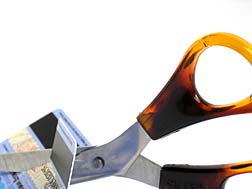Stories that children, and even dogs receiving credit card applications are legion. A little brevity in the face of a serious subject.
 But here's something to wipe that smile off your face: the realization that a balance of $1000 on your credit card - maintained at minimum payment levels - could take 22 years to retire. That's right - 22 years. That's assuming you do no more than make the regular, monthly payments, and you resist the urge to add any further debt to the card.
But here's something to wipe that smile off your face: the realization that a balance of $1000 on your credit card - maintained at minimum payment levels - could take 22 years to retire. That's right - 22 years. That's assuming you do no more than make the regular, monthly payments, and you resist the urge to add any further debt to the card.An estimated 40 per cent of American households carry a balance from month to month, and simply paying the minimum, assuming a 2 or 2.5 percent payment-to-balance ratio, would result in thousands of dollars of accumulated interest for that $1,000 purchase, and 22 years to retire it completely.
You could have a child, and see that child graduate from college, or get married and have a child of his own in the time it takes you to pay off that $1,000 baby's room. HIS baby room.
Little wonder that Americans are caught in a spinning spiral of credit card debt - and the companies don't make it any easier by racking up the interest rate, and tacking on additional fees and penalties - all designed to keep your debt on their books longer.
The longer you take to pay it off (if you ever do), the better it is for them - and at 30 per cent, they're not making it any easier on you.
If anything, the credit card companies are lining their pockets at your expense.
Before recessing for the summer, both houses of the New York State legislative assembly reached an agreement prohibiting the unsavoury practise of universal default - a 'feature' that appears to allow one credit card lender to up the interest rate on their card, when a fault has been registered with another.
In fact, two years ago a joint recommendation before the U.S. Banking Committee Oversight Hearing on Unfair Credit Card Practises listed several recommendations designed to end fraudulent and unfair practices, and to create overall a more sensible environment for the borrower.
In other words, don't make it so easy for us to acquire a card, and to use it. Determine our capacity to pay before issuing the card. If it's not in our best interest financially, then by all means don't issue the card.
Other recommendations, of a more specific nature, addressed everything from fees, to penalties, the real due date, deceptive advertising practices, and a reasonable attempt to balance the fee structure against the actual cost of providing those services.
Credit card companies should not be allowed to entice the consumer with promises and special offers, only to hike the rates and put on new fees.
To hook the consumer like a rock bass on a fishing line.
Some consumers have seen their interest rates rise to 29.9 per cent - and customers who have defaulted on their payments but once, have seen their rates increase to 40 per cent, in some cases.
Many holders of Providian credit cards, who saw their accounts transferred to Chase Bank, saw their interest rates swell higher, simply as a result of the transfer.
READ MORE LEGAL NEWS
There are options, and strategies to stickhandle your cards and debt levels more effectively.
First, don't buy anything on credit that you know you can't pay for. Make sure you have the full balance available when the card comes in, and pay your balance in full and on time to avoid penalties and rate hikes. By 'on time', we mean several days AHEAD of the due date.
Read your contract, including the fine print. Likewise if you receive, and accept a special offer. Know what you're entitled to, including the conduct and fair play that is your due as a responsible cardholder.
In the end, if you feel the credit card company is taking you to the cleaners and acting unfairly, fight back!
